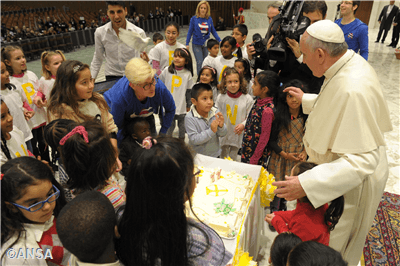Father Joseph Fessio, publisher of my magazine Catholic World Report, was on the Hugh Hewitt radio show a couple of weeks ago and quoted some remarks he attributed to Pope Benedict on Islam. Those remarks have started a buzz that threatens to become a firestorm. The latest is in today’s Washington Times, but now Father Fessio is clarifying what he said.
First, this is what the Times reports: “... Pope Benedict XVI is said to believe that Islam is incapable of reform.” Unfortunately, this is not true.
Father Fessio has sent the following letter to the Times:
I think it is important for me to give context to and clarify the remarks I made recently in a radio interview with Hugh Hewitt, reported in the January 20th Washington Times.
The most important clarification is that the Holy Father did not say, nor did I, that “Islam is incapable of reform”.
What I did say—and it contains an unfortunate ambiguity—is that “in the Islamic tradition, God has given His word to Mohammed, but it’s an eternal word. It’s not Mohammed’s word. It’s there for eternity the way it is. There’s no possibility of adapting it or interpreting it, whereas in Christianity, and Judaism, the dynamism’s completely different, that God has worked through His creatures.”
Read the rest of the letter
Technorati Tags: Catholic, doctrine, Islam, Pope Benedict, Vatican





Color me dense, but is Fr. Fessio implying that the Koran in any way, shape or form actually came from God any more than the Book of Mormon did?
Nah; he indicates (paragraph 3) that he’s describing what “the Islamic tradition” holds about the Koran.
I think the Pope was making a point about Muslims’ understanding of the Koran—every word dictated by God to Mohammed—and how that sets limits on the relationship of faith and reason in the Islamic tradition. Not a lot of room for textual analysis there.
There is only one God. He did not give two words.
Note to “ecumenical” types: time to end the supercilious word-play and pick what side you are on.
Neither Fr. Fessio nor Pope Benedict believe there are two Gods or that there are two Words.
What he’s saying is that Muslims believe that Allah is God and that the Koran is his word. And if we’re going to understand them and deal with them, we have to understand how they think.
This isn’t suepercilious wordplay. It’s dealing with reality.
We’ve known how they think since they began acting upon their thinking by converting by the sword. Anyone who doesn’t think like they think (believe) is an Infidel beneath contempt. Not much room to negotiate there. What troubles me is that somewhere along the way the Church seems to have tossed Islam is heresy overboard and replaced it with we all believe in the same God with a capital G. Funny thing is, you never hear such ‘heresy’ from a Muslim.
Obscurantism (n.): a policy of opposition to the extension or dissemination of knowledge.
No, he’s saying that Muslims believe the Koran is from God, not necessary that it (in truth) is. But he’s also saying that the way the Koran is written, understood and interpreted is different than the other two “religions of the book,” namely Christianity and Judaism.
He’s saying that the Koran is accepted just as it is, in the written form, as if it were dropped out of the sky. Whereas the Bible has the Church to guide interpretation for us, and Judaism has the Midrash and generations of biblical scholars to guide interpretation for them, the Koran does not have that. Indeed, there much less mediation, even though there are some Islamic scholars. The Muslims have been far less accomplished in this compared to their Jewish and Christian counterparts.
There is a large cultural component in this. Moslems tend to “sit on” collections of information as if they were “prize collections” ie. possessions. There was a book about this a few years ago—a rather good book called “What went wrong” I believe.
It’s also true that the Muslim world has yet to confront modernity truly and integrate world views successfully. This is responsible for a huge part of the anger with the west.
I shared orthodox’s concern about the phrase Fr. Fessio uses. The phrase “in the x-tradition” is ecumenospeak which does not want to offend anyone and in which all religions are on the same level. I know that is not what Fr.Fessio meant but the phrase does have an indifferentist pedigree. I had one professor in theology who used that phrase all the time because for him everyone else was an anonymous Christian.